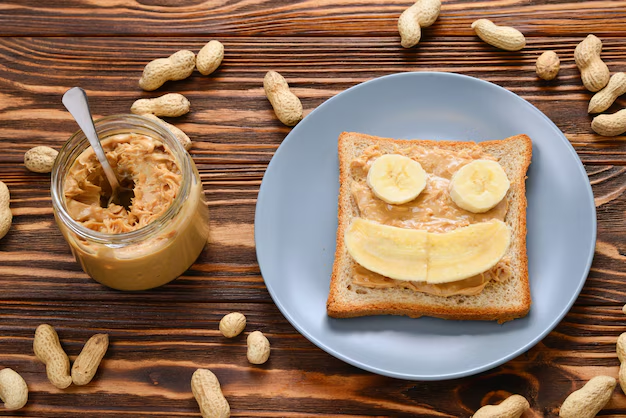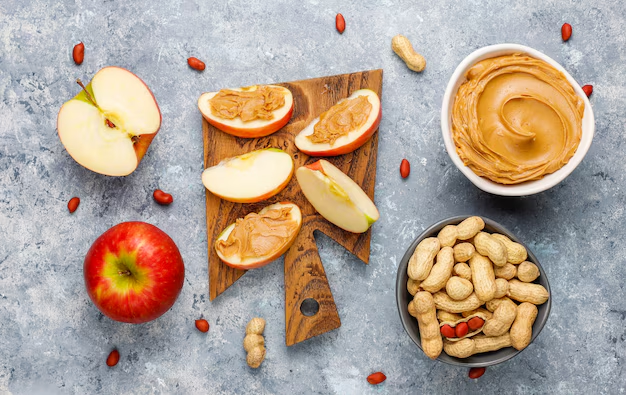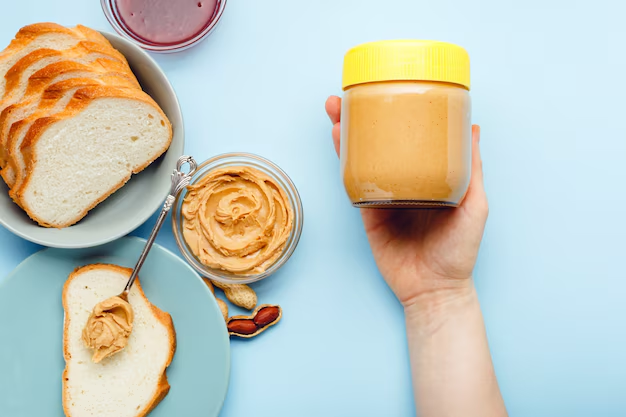Peanut butter is a pantry staple that sparks both praise and debate in health discussions. Known for its creamy texture and rich flavor, it’s a beloved choice for snacks and breakfast. But is peanut butter good for you? That’s a question worth exploring.
In this article, we’ll uncover its nutritional profile. We’ll dive into its health benefits and examine potential risks. Whether you’re a fitness enthusiast, a busy parent, or someone looking for a wholesome snack option, understanding how this butter fits into your diet can make all the difference.
Peanut Butter Nutrition Overview
It is packed with nutrients, making it a powerhouse for both energy and nourishment. A typical two-tablespoon serving provides approximately:
- Calories: 190-210
- Protein: 7-8 grams
- Healthy Fats: 16 grams (mostly monounsaturated and polyunsaturated fats)
- Carbohydrates: 6-8 grams (including 1-2 grams of fiber)
- Vitamins and Minerals:
- Vitamin E: A potent antioxidant.
- Magnesium: Supports muscle and bone health.
- Potassium: Balances sodium levels for heart health.
- B Vitamins: Essential for energy metabolism.
Macronutrient Highlights
Peanut butter is celebrated for its balanced macronutrient profile. The high protein content supports muscle repair, while healthy fats provide sustained energy. The fiber aids digestion, keeping you full for longer. Additionally, its low sugar content (in natural varieties) makes it a healthier choice compared to processed spreads.
When selecting this butter, opt for natural or organic versions with minimal added sugars or hydrogenated oils. This ensures you reap the full spectrum of its nutritional benefits.
Health Benefits
The health benefits of peanut butter are given below:

1. Satiety and Weight Management
Peanut butter is a satisfying snack that curbs hunger thanks to its protein and fiber. When consumed in moderation, it can help prevent overeating, making it a useful tool in weight management. Adding it to breakfast or a mid-day snack provides lasting energy and reduces cravings for less nutritious foods.
2. Energy Boost for Active Lifestyles
Packed with healthy fats and calories, it is an excellent energy source. Athletes and fitness enthusiasts often turn to it as a pre- or post-workout snack. It fuels exercise, aids recovery, and keeps blood sugar levels steady, ensuring peak performance throughout the day.
3. Specific Benefits by Gender
- For Females: Hormonal and Bone Health
Women benefit from peanut butter’s nutrient-dense profile in several ways:
- Hormonal Balance: The monounsaturated fats support hormone production, particularly during reproductive years.
- Bone Strength: Magnesium and potassium work together to strengthen bones and prevent conditions like osteoporosis.
- Sustained Energy: It provides a steady energy boost, especially during demanding phases like pregnancy or breastfeeding.
- For Males: Muscle Recovery and Testosterone Support
Men can rely on peanut butter for its unique advantages:
- Muscle Recovery: Protein in this butter aids in muscle repair, especially after resistance training.
- Testosterone Support: Healthy fats, particularly monounsaturated ones, promote testosterone production, which is crucial for overall vitality and strength.
- Convenience: As a portable snack, it fits seamlessly into the diets of busy individuals looking for quick nutrition.
4. Heart Health: Is Peanut Butter Good for Your Heart?
Peanut butter contains monounsaturated fats, which are heart-friendly. These fats lower bad cholesterol (LDL) while boosting good cholesterol (HDL). Additionally:
- Vitamin E and Antioxidants: Protect the heart by reducing oxidative stress.
- Potassium: Helps regulate blood pressure, counteracting the harmful effects of sodium.
When consumed in moderation, it supports cardiovascular health, making it a smart choice for those aiming to maintain a healthy heart.
5. Liver Health: Is Peanut Butter Good for Your Liver?
Moderate consumption of peanut butter can be beneficial for liver health. Its monounsaturated fats and antioxidants play a role in reducing fat accumulation in the liver, a common issue associated with conditions like non-alcoholic fatty liver disease (NAFLD). Additionally:
- Low in Saturated Fat: It is relatively low in saturated fats compared to other spreads, preventing strain on liver function.
- Rich in Magnesium: This mineral supports liver enzymes and aids detoxification processes.
Incorporating it into a balanced diet promotes liver health and reduces the risk of chronic liver conditions.
Peanut Butter and Weight Management

This butter can play a role in both weight loss and weight gain. Its nutritional composition makes it a flexible addition to different dietary goals.
For Weight Loss: Is Peanut Butter Healthy for Weight Loss?
Yes, it can aid in weight loss when eaten in moderation. Its high protein and healthy fat content help control hunger and prevent overeating. The fiber in it also promotes satiety, making you feel full for longer. This reduces the chances of unhealthy snacking between meals.
However, portion control is critical. This butter is calorie-dense, with about 190-210 calories per two tablespoons. Eating more than a serving can quickly add up, hindering weight loss goals. Stick to natural peanut butter, as added sugars in processed varieties can sabotage your efforts.
For Weight Gain: Is Peanut Butter Good for Weight Gain?
If you’re looking to gain weight, peanut butter is an excellent option. Its caloric density makes it easy to increase your daily calorie intake without consuming large portions. Spread it on whole-grain bread, mix it into smoothies, or use it as a topping for oatmeal.
Peanut butter’s protein content also supports muscle building, making it a favorite among athletes and those following bulking diets. Choosing a natural one ensures that the calories come from healthy sources, not added sugars or hydrogenated oils.
Special Considerations
Peanut butter’s nutritional benefits extend to specific scenarios like pregnancy and nighttime snacking. However, some considerations must be taken into account.
Is Peanut Butter Good for You While Pregnant?
Yes, it is generally safe and beneficial during pregnancy. It provides essential nutrients like protein, healthy fats, and folate. Folate is crucial for fetal development as it helps prevent neural tube defects. The protein content supports the growth and repair of tissues, both for the baby and the mother.
Its monounsaturated fats contribute to energy needs and hormonal balance. It also contains magnesium and potassium, which help regulate blood pressure—a common concern during pregnancy.
For pregnant women with a history of peanut allergies, caution is necessary. Consult a doctor before adding it to your diet. Choose natural varieties to avoid added sugars and preservatives that may not be ideal for your health.
Is Peanut Butter Good for You Before Bed?
Peanut butter can be an excellent snack before bed. Its combination of protein and healthy fats helps stabilize blood sugar levels overnight. This prevents hunger pangs and promotes restful sleep.
For those who exercise in the evening, it supports muscle recovery. It provides amino acids that repair and strengthen muscles during sleep. Pair it with a slice of whole-grain bread or a banana for a balanced nighttime snack.
However, avoid consuming large portions. Overeating before bed can lead to indigestion or unnecessary calorie intake. A tablespoon of it is enough to reap the benefits.
Risks and Side Effects

While peanut butter is nutritious, overconsumption or certain conditions can pose risks. Let’s explore its potential downsides.
Is Peanut Butter Bad for You?
Peanut butter is not inherently bad, but issues arise with allergies and overconsumption. Peanut allergies can cause severe reactions, including swelling, difficulty breathing, or even anaphylaxis. Always check for allergies before consuming it.
Overeating this butter can lead to excessive calorie intake, which may result in weight gain. Processed butter often contains added sugars and hydrogenated oils, which are harmful to health. Always opt for natural butter to avoid these risks.
Is Peanut Butter Bad for Cholesterol?
Natural peanut butter can actually improve cholesterol levels. It’s rich in monounsaturated fats, which help lower bad cholesterol (LDL) and increase good cholesterol (HDL). However, processed varieties containing trans fats can have the opposite effect. Trans fats raise LDL cholesterol, increasing the risk of heart disease.
To support healthy cholesterol levels, stick to natural butter without added oils or artificial ingredients.
Side Effects of Eating Peanut Butter Every Day
Eating it daily in moderation is generally safe. However, excessive consumption can lead to:
- Digestive Issues: Its high-fat content can strain digestion when eaten in large amounts.
- Aflatoxin Risks: Peanuts can be contaminated with aflatoxins, toxic compounds produced by mold. While the risk is low in regulated products, consuming large quantities may increase exposure.
- Excessive Calorie Intake: It is calorie-dense. Overeating can hinder weight management efforts, even in healthy diets.
Moderation is key. A serving or two per day is sufficient to enjoy its benefits without adverse effects.
FAQs
Does peanut butter have protein?
Yes, it is rich in protein, making it a great plant-based option for muscle maintenance and energy.
Is peanut butter healthy for weight loss?
It can support weight loss when eaten in moderation. Its protein and fiber content promote satiety and reduce overeating.
Is peanut butter bad for cholesterol?
Natural peanut butter is good for cholesterol. It lowers LDL and boosts HDL levels. However, avoid processed varieties with trans fats.
Is peanut butter good for you while pregnant?
Yes, it provides essential nutrients like protein, folate, and healthy fats, which are beneficial during pregnancy.
Conclusion
Peanut butter is a nutritious and versatile food with numerous health benefits. It supports weight management, energy levels, heart health, and more. However, moderation is essential to avoid potential risks. Choose natural butter to maximize its benefits and minimize unhealthy additives.
Whether you’re pregnant, active, or simply looking for a healthy snack, peanut butter can be a great addition to your diet when consumed wisely.

